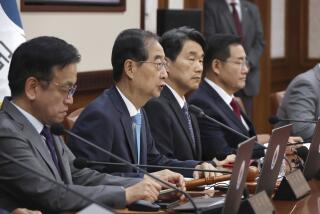No help from Seoul
- Share via
A MONTH AFTER North Korea tested a nuclear bomb, making the Korean peninsula a more dangerous place, the peninsula’s other nation stepped forward with its response. Or rather, its lack thereof. On Monday, South Korea announced that it would impose no new sanctions on its northern neighbor.
South Korea’s reluctance to crack down on Kim Jong Il’s regime could undermine the coming six-nation disarmament talks, scheduled for next month and involving both Koreas and the U.S., Japan, Russia and China. The toothlessness of its response to Kim’s aggressive pursuit of nuclear weapons puts the U.S. and Japan, which favor more aggressive tactics, in a weak negotiating position. Without support from China and South Korea, the current U.N. sanctions will give Kim little reason to change his behavior.
Particularly disappointing for the Bush administration is Seoul’s refusal to sign on to the Proliferation Security Initiative, or PSI, a 2003 program calling for member nations to interdict and inspect ships suspected to be carrying weapons of mass destruction for rogue states. South Korea, fearful that such interdictions could prompt a collapse of the cease-fire that has been in place since the Korean War, made it clear Monday that it wouldn’t join anytime soon.
The PSI does have its problems. Though 70 nations have joined, their legal authority to intercept ships in international waters is murky. Yet given the urgency of halting nuclear proliferation, it’s a valuable tool.
Setting aside the PSI, Seoul is passing up other opportunities to display some backbone in the face of Kim’s aggression. South Korean tourists are pouring money into a resort at Mt. Kumgang across the northern border, and the two governments are also cooperating in a North Korean industrial park. Both projects are the result of then-President Kim Dae-jung’s “sunshine policy” of engagement, which has been continued by his successor, Roh Moo-hyun.
These developments provide millions for Kim’s regime to spend on weapons research. But they have utterly failed to lower tensions between the two countries or open North Korean society to the outside world.
South Korea’s relationship with its northern neighbor is more fraught with history and emotion than any of the other four nations involved in negotiations with Kim’s regime. To this day there remain families separated by the demilitarized zone along the 38th Parallel. But South Korea should understand that the North may better appreciate the sunshine if it’s threatened by a few clouds.
More to Read
Sign up for Essential California
The most important California stories and recommendations in your inbox every morning.
You may occasionally receive promotional content from the Los Angeles Times.













